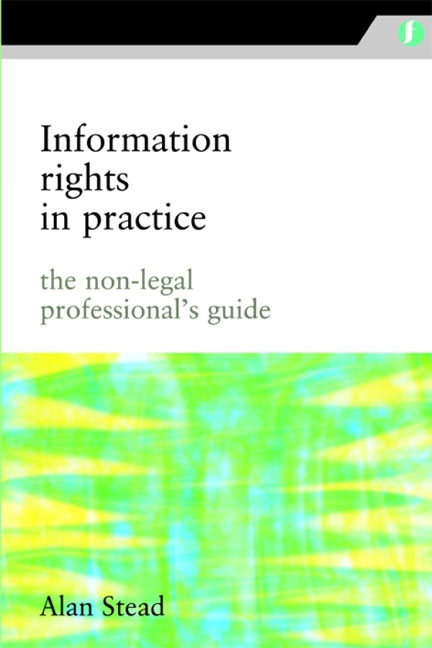Book contents
- Frontmatter
- Contents
- Acknowledgements
- Table of statutes and case law
- Abbreviations
- 1 Introduction
- 2 Data Protection Act 1998
- 3 Definitions of personal data
- 4 The scope of the Data Protection Act
- 5 The data protection principles
- 6 Access to personal data
- 7 Data sharing
- 8 The Freedom of Information Act 2000 and Environmental Information Regulations 2004, SI 2004/3391
- 9 Scope of the Freedom of Information Act 2000 and the Environmental Information Regulations 2004
- 10 Application of exemptions and exceptions
- 11 The public interest test
- 12 Publication schemes
- 13 Compliance, the Information Commissioner and the Information Tribunal
- 14 Disclosure logs
- 15 Records management – Section 46 code of practice
- 16 Other legislation
- 17 Interaction of the legislation
- 18 Summary
- Appendix 1 Data protection principles
- Appendix 2 Flow chart of FOI
- Appendix 3 Exemptions and exceptions under the Freedom of Information Act 2000 and the Environmental Information Regulations 2004
- Appendix 4 Bibliography and useful web addresses
- Appendix 5 Published standards for records management
- Index
- Frontmatter
- Contents
- Acknowledgements
- Table of statutes and case law
- Abbreviations
- 1 Introduction
- 2 Data Protection Act 1998
- 3 Definitions of personal data
- 4 The scope of the Data Protection Act
- 5 The data protection principles
- 6 Access to personal data
- 7 Data sharing
- 8 The Freedom of Information Act 2000 and Environmental Information Regulations 2004, SI 2004/3391
- 9 Scope of the Freedom of Information Act 2000 and the Environmental Information Regulations 2004
- 10 Application of exemptions and exceptions
- 11 The public interest test
- 12 Publication schemes
- 13 Compliance, the Information Commissioner and the Information Tribunal
- 14 Disclosure logs
- 15 Records management – Section 46 code of practice
- 16 Other legislation
- 17 Interaction of the legislation
- 18 Summary
- Appendix 1 Data protection principles
- Appendix 2 Flow chart of FOI
- Appendix 3 Exemptions and exceptions under the Freedom of Information Act 2000 and the Environmental Information Regulations 2004
- Appendix 4 Bibliography and useful web addresses
- Appendix 5 Published standards for records management
- Index
Summary
Introduction
There is no legal requirement for any public authority to have a disclosure log although a Best Practice Guidance on the subject was issued by the Department for Constitutional Affairs in December 2005.
An individual can make a request under the Freedom of Information Act 2000 or the Environmental Information Act 2004 for information held by a public authority and they must be told, in most cases, whether or not the information is held and, if information is withheld, the reasons why it is withheld.
The authority probably already has a record of the requests it has received and how they were handled, including the date of receipt and the response given. This might be anything from a paper record to a fully comprehensive workf low management system on the computer. A disclosure log is the base data extracted from this record and made available to the public.
Benefits
Why should this information be made available? The purpose of the Freedom of Information Act and the Environmental Information Regulations is to make as much information available as possible, and frequently the same or similar requests will be made by a number of separate individuals – local authority staff will have lost count of the number of requests relating to topics such as cooling towers, for example. Similarly the courts have recognized that once information has been released under the Freedom of Information Act it is in the public domain, copyright etc. notwithstanding. As requests are received purpose-blind any information that is released can be used for whatever purpose the requester wishes, provided that the copyright laws are not breached.
A disclosure log can make information available to a wider audience as repeat requests can be directed to the log. Information made available in this way is eligible for a section 21 exemption (see paragraph 10.2.1, Chapter 10). This will save time for the authority in providing the information again (unless it has changed substantially) and enable a faster response to the requester.
Providing information freely in this way also helps dispel the perception of secrecy that often surrounds the public sector. Those who wish to know how an authority is handling certain matters can have easy access to items in the the decision-making process which another person has already requested.
- Type
- Chapter
- Information
- Information Rights in PracticeThe non-legal professional's guide, pp. 145 - 150Publisher: FacetPrint publication year: 2008

